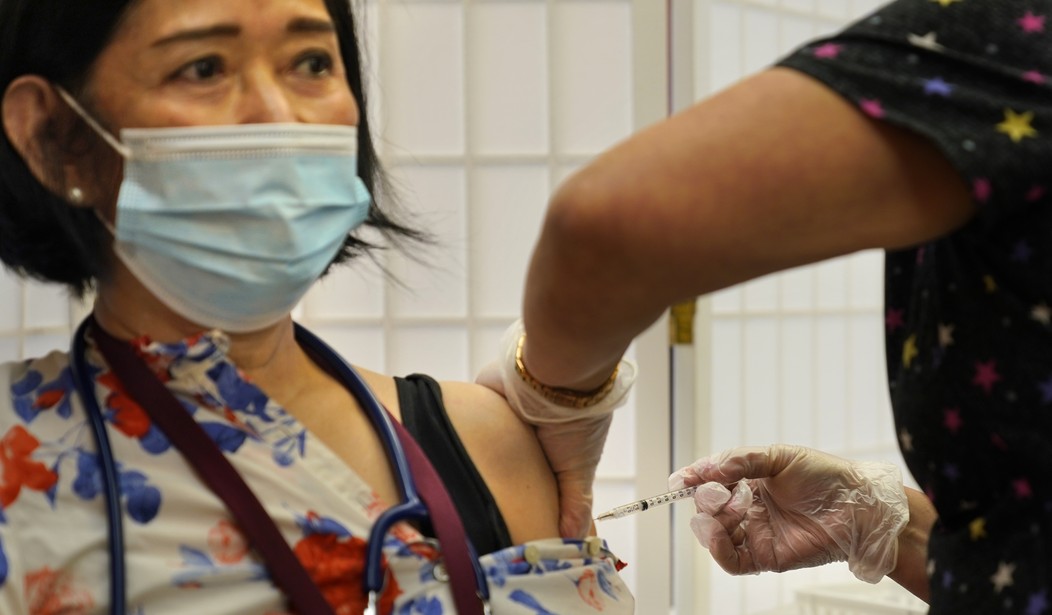It wouldn’t be the worst news if the latter part of the headline is true. If people with immunity of one form or another have only mild symptoms after encountering Omicron then the vast majority of the U.S. population should have only mild symptoms as it spreads here. Between the share of the public that’s vaccinated and the share that’s had COVID, there must be well north of 70 percent among us who have little to fear. And of the remaining share, a huge chunk are children who likely won’t have any difficulty with the variant.
It’s the share of non-immune adults, of which there are millions, whom scientists are worried about.
I posted this illustration from biostatistics professor Natalie Dean last night but it merits posting again.
A sketch to explain how a new variant may appear milder even with no change in underlying virulence. This can occur because, when calculating the fraction of cases that are severe, the denominator now includes many re-infections that had previously been averted. A thread. 1/8 pic.twitter.com/XxrYHnb6XY
— Natalie E. Dean, PhD (@nataliexdean) December 9, 2021
Dean’s making the point that we have a sample problem in trying to assess how dangerous Omicron is. We shouldn’t jump to conclusions that it’ll be “mild” for the average non-immune adult just because it looks mild in the people it’s infected to date. At this stage of the pandemic, when most have already acquired a degree of protection from the vaccines or from prior infection, chances are that it’s also mostly those same people who have caught the variant so far. Prior immunity isn’t enough to prevent one from contracting Omicron, it appears, but it may be enough to prevent severe illness.
What happens when Omicron starts infecting the non-immune minority, though? Will it be “mild” for them too?
Virologist Trevor Bedford shares Dean’s concern that the apparent “mildness” of the variant might be a statistical mirage:
I believe this can likely explain a large degree (and potentially all) of the reduction of severity that's been observed so far. In general immunity is more robust to severe outcomes than infection. 20/21
— Trevor Bedford (@trvrb) December 10, 2021
So does a British expert:
UK may have highest or close to highest level immunity of any country in the world result of very high vaccine acceptance & a lot of transmission (running a hot epidemic see below) & yet now omicron doubling every 2d. Impact of omicron in less immune populations a huge concern pic.twitter.com/bqlzJHju2w
— Jeremy Farrar (@JeremyFarrar) December 10, 2021
So does this doctor, an expert in respiratory diseases:
In December 2019, SARS-CoV-2 entered a human population that had no immunity to it. In December 2021, the Omicron variant is entering a human population that has a large amount of immunity to SARS-CoV-2. That immunity in and of itself will lessen the disease severity of the variant. But in people with limited or compromised immunity, such as the unvaccinated, the elderly or the immune compromised, SARS-CoV-2 may still be able to cause severe disease because they don’t have protection conferred by pre-existing immunity. Covid-19 becoming a milder disease is not a decision the virus will make, it’s a decision that all of us can make if we take advantage of the vaccines that can control spread and reduce the burden of this disease.
“This makes me wonder how close we’re getting to a flu-like situation, where the seasonal vaccine works better on some flu viruses than others, but in any event tends to limit the damage,” William Saletan of Slate observed. I’m wondering the same. The flu shot is typically pitched as something that might not prevent you from getting the flu but should prevent you from experiencing nasty symptoms. That looks like the situation with Omicron. It’s crafty enough to infect people who’ve had their shots but seemingly not capable of spreading quickly enough in most such people to send them to the hospital.
Even three shots is no guarantee against infection by the variant, in fect. Check this out:
Omicron's formidable immune evasiveness:
First report of a cluster of 7 cases in young people all with 3rd shots 1-2 months previously, high anti-spike antibody levels. Symptoms mild to moderate https://t.co/jqVgPoQRct pic.twitter.com/3lubDdy1SA— Eric Topol (@EricTopol) December 10, 2021
Seven triple-vaxxed people, six of whom were age 27 or younger, and all of them ended up with some degree of illness. If even the boosted are susceptible to catching the virus and spreading it then literally everyone is a potential vector of transmission, regardless of their immune status. In that single respect, we may be back to something like square one with infection — albeit with tons more immunity across the population and pharmaceutical options to mitigate the effects.
One British scientist warned the public not to celebrate the apparent “mildness” of a virus that spreads at lightning speed in a population in which no one is immune from infection:
Speaking at the online event, Edmunds dismissed suggestions that the Omicron variant might be “good news” if it hospitalised people at only half the rate as the Delta variant. The hope comes largely from hospital admissions in South Africa, where the population is far younger than in the UK and so less likely to experience severe Covid illness in the first place. While the average age in the UK is just over 40, it is less than 28 in South Africa.
Edmunds said there was “not a shred of evidence” that Omicron was half as pathogenic as the Delta variant, but added that even if this were the case, it might not make the difference people hoped for. “This is a very severe setback. There is no question about that.”
“If you are worried about the time [at] which the NHS might start to get very stressed, then halving the hospitalisation rate means that buys you two to three days. I think it’s really silly to suggest this is good news; it couldn’t be further from that,” he added. “This is as bad news as you can possibly get, quite frankly.”
Edmunds is doing the math about how many old, immunocompromised, and/or non-immune people might need hospital care — simultaneously — if a virus that’s “mild” in those with immunity infects basically the entire population at the same time. According to Bedford’s calculations, the number of people with Omicron in the UK is doubling every 48 hours or so (“exceptionally rapid”) despite the fact that Great Britain has a huge amount of population immunity, which in theory should limit transmission. It’s not, because no degree of immunity seems able to prevent infection by this particular variant.
I’ll leave you with two graphs that neatly illustrate why we shouldn’t assume Omicron is inherently milder than Delta. The numbers on severe illness in South Africa are encouraging…
Considerably less Omicron wave hospitalizations and deaths in South Africa is more than welcome news, no matter how it occurshttps://t.co/Ubue3EMFSW https://t.co/82s0EhT8oO pic.twitter.com/SbkBZPMcFc
— Eric Topol (@EricTopol) December 10, 2021
…but the numbers on severe illness from Delta, which has killed hundreds of thousands of people, also look “encouraging” when compared to prior waves:
A reduction in rates of severe disease and death relative to cases is not a new pattern!
Remember first chart in this thread? Here’s the exact same pattern, but in UK.
Did we say “Delta appears to be milder”? Nope. What changed was levels of immunity, here mostly via vaccines. pic.twitter.com/g8VRwao751
— John Burn-Murdoch (@jburnmurdoch) December 10, 2021
People are dying during the Delta wave at a much lower rate than in previous waves not because Delta is “mild” but because most of us are either vaccinated or have recovered from a COVID infection by now. We’re stronger, the virus isn’t “milder.” That may also be true of Omicron, which means bad vibes for the non-immune.








Join the conversation as a VIP Member